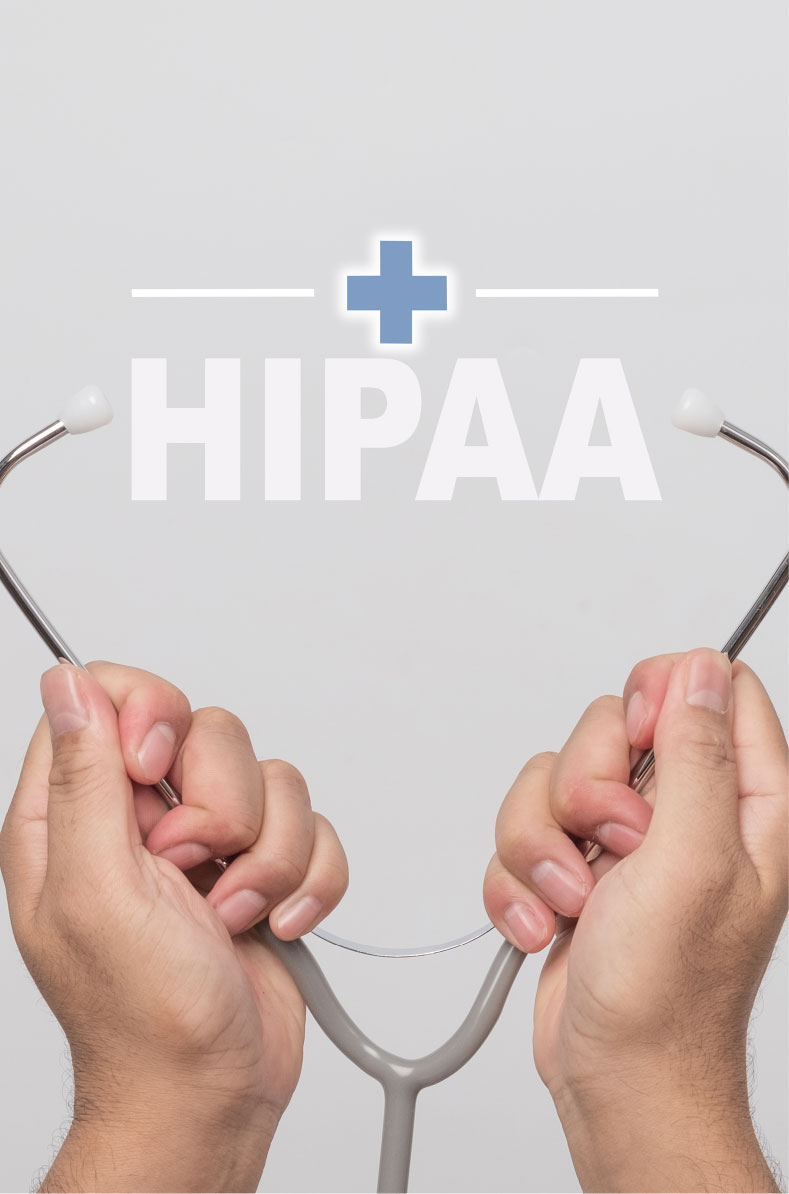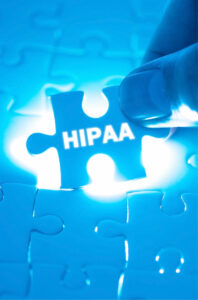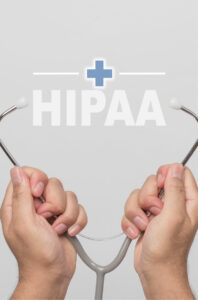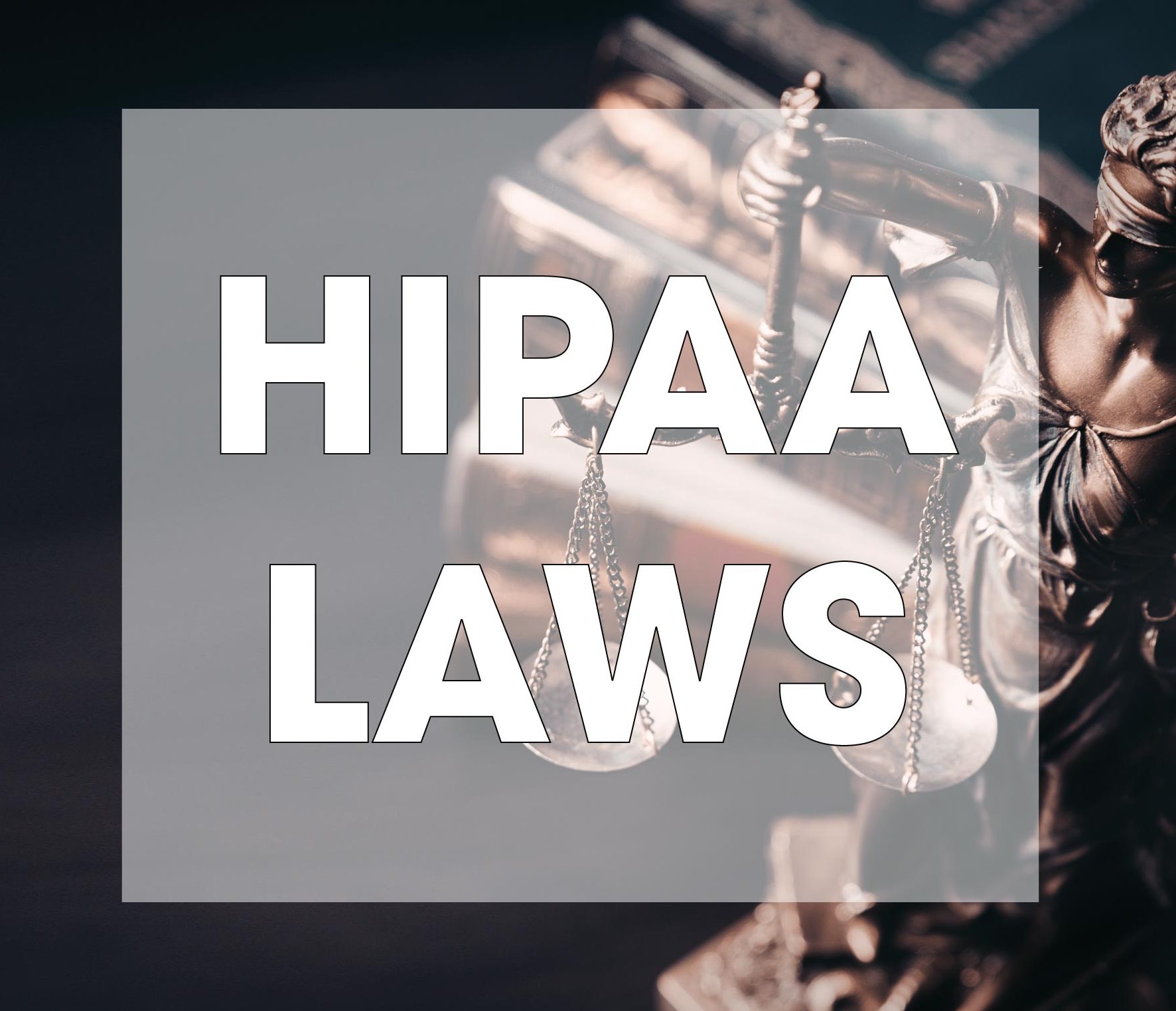
The HIPAA laws – sometimes known as the HIPAA Rules or the HIPAA regulations – are the standards contained within the Administrative Simplification provisions of the Healthcare Insurance Portability and Accountability Act 1996. These standards govern the way in which Covered Entities conduct electronic transactions, maintain patient privacy, and safeguard Protected Health Information (PHI) to ensure its confidentiality, integrity, and availability.
This article provides an overview of the HIPAA laws and explains who they apply to, what information is protected under HIPAA laws, and what happens when violations of HIPAA laws occur. We have also provided information about the penalties that can be imposed for knowingly violating HIPAA and what new HIPAA regulations are being proposed. However, it is important to note that HIPAA provides a federal floor of standards, and more stringent standards may apply in some states.
Covered Entities under HIPAA
The term “Covered Entities” means the entities (businesses, organizations, non-profits, etc.) that are covered by the HIPAA laws. Generally, HIPAA Covered Entities are:
- Health plans
- Healthcare clearing houses
- Healthcare providers that transmit any information in an electronic form in connection with a transaction for which the Department of Health & Human Services (HHS) has adopted a standard.
Most healthcare providers – but not all – qualify as HIPAA Covered Entities and must comply with the HIPAA laws. Additionally, there are some entities that are required to comply with some HIPAA laws, but not others. These are known as “partial entities” and can include employers that administer self-insured health plans, educational facilities that provide medical services to the public, and Medicare prescription drug card sponsors.
Covered Entities can only use or disclose PHI under certain circumstances without a patient´s authorization. One of these circumstances is when they disclose PHI to a third-party for a healthcare-related function or activity. Third parties to whom PHI is disclosed are known as Business Associates, and they must also comply with the HIPAA laws – and any pre-empting state laws – while performing a function or activity on behalf of the Covered Entity.
What Information is Protected Under HIPAA Laws?
Before discussing what the HIPAA laws consist of, it is a good idea to explain what information is protected under the HIPAA laws in order to best understand the purpose of the laws and why they are enforced in the ways they are.
The information protected under HIPAA is known as Protected Health Information (PHI). PHI consists of eighteen “identifiers” that, individually or together, could be used to identify the subject of the information or “for which there is a reasonable basis to believe” could be used to identify the subject of the information.
The protected information can be in any form or media (i.e., electronic, paper, oral, etc.); however, the Privacy Rule (see below) notes that PHI is only protected when it is created, used, processed, maintained, or transmitted by a Covered Entity or its Business Associate and when the activity relates to:
- The individual’s past, present or future physical or mental health or condition,
- The provision of health care to the individual, or
- The past, present, or future payment for the provision of health care to the individual.
There are exceptions to this explanation inasmuch as health information maintained in employment records is not protected under HIPAA laws if the employer is also a Covered Entity or Business Associate. It is also the case that PHI maintained by educational institutions is not protected under HIPAA laws if it is already protected under the Family Education Rights and Privacy Act (FERPA).
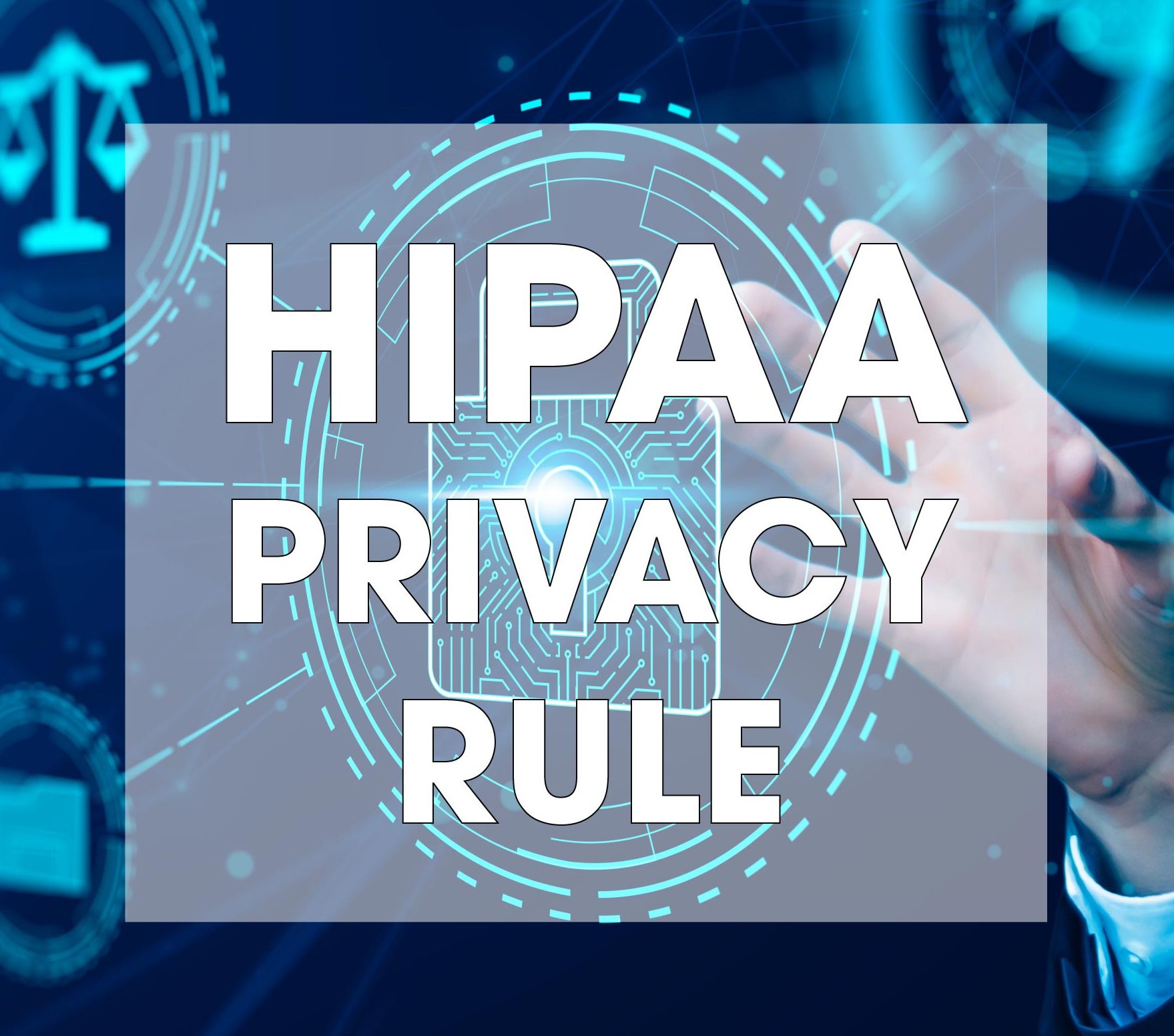
The HIPAA Privacy Rule
The HIPAA Privacy Rule was the first of the HIPAA laws to be enacted in 2002. The Rule had the objective of assuring individuals´ health information is properly protected, while allowing the flow of health information required to support high quality health care and public health. As well as defining who the HIPAA Privacy Rule applied to and the nature of information protected under HIPAA, the Rule also explains the allowable uses and disclosures of PHI.
The allowable uses and disclosures are broken down into three categories:
- Those that are required – to individuals on request and to inspectors from HHS´ Office for Civil Rights (OCR) who are conducting an investigation or compliance review.
- Those that are permitted – for treatment, payment, and healthcare operations purposes, incidental disclosures (explained below) and when disclosures are in the public interest.
- Those that require the authorization of the data subject – for example, to a life insurer for coverage purposes or to a prospective employer if the PHI relates to a pre-employment test.
The Privacy Rule also goes into great depth about patients´ rights. These include the right of a patient to request a copy of their medical records, to review it, and to request corrections when any information is inaccurate or incomplete. Patients can also request restrictions to permitted uses and disclosures of PHI and an accounting of disclosures to see who their PHI has been disclosed to. Covered Entities are required to inform patients of their rights via a Notice of Privacy Practices.
While the failure to comply with the “Individual Rights” section of the Privacy Rule is one of the leading causes of complaints to OCR, the area of the Privacy Rule that Covered Entities struggle with most is the Administrative Requirements. This is because the Administrative Requirements have been developed to apply to every type of Covered Entity from small rural medical practice to large multistate enterprise, and therefore they are “flexible” and open to misinterpretation.
One of the areas open to the most misinterpretation is workforce HIPAA training. The workforce training standard – taken on its own – implies that members of the workforce (including volunteers, agency workers, members of the clergy, etc.) require one-time training on the Covered Entity´s policies and procedures that apply to their roles. However, Covered Entities are also required to maintain safeguards to prevent violations of the Privacy Rule, which would imply ongoing training is necessary to prevent shortcuts being taken “to get the job done”, and the shortcuts developing into a cultural norm of non-compliance.
The HIPAA Minimum Necessary Standard and Incidental Disclosures
One very important part of the HIPAA Privacy Rule is the standard related to “Limiting Uses and Disclosures to the Minimum Necessary”. This standard stipulates that Covered Entities must make reasonable efforts to use, disclose, or request (for treatment or payment purposes) only the minimum amount of PHI necessary to achieve the objective of the use, disclosure, or request. Any unreasonable disclosure is considered to be a violation of HIPAA.
The exception to this standard is when disclosures are made “incidental” to a permitted use or disclosure of PHI. In these circumstances, although more than the minimum information necessary may have been disclosed, it is not considered to be a violation of HIPAA if the incidental disclosure was relevant to the permitted disclosure, if it was limited in nature, and if it could not reasonably have been prevented by the Covered Entity´s due diligence.
HIPAA Documentation and Retention Requirements
The need to document compliance efforts features extensively throughout the HIPAA Privacy Rule. All policies and procedures must be documented, workforce training must be documented, the distribution of Notices of Privacy Practices must be documented, and all patient authorizations and complaints must be documented. Documentation is important because, without it, it can be difficult to prove compliance if a Covered Entity is subject to an OCR inspection or compliance audit.
The HIPAA Privacy Rule states that documentation relating to policies and procedures and privacy practices must be retained for a minimum of six years from the date they were last effective. However, if state or federal regulations require a longer document retention, the state or federal regulation preempts HIPAA, and the longer retention period applies. It is also important to retain any documentation for longer than stated if a compliance investigation or litigation is ongoing.
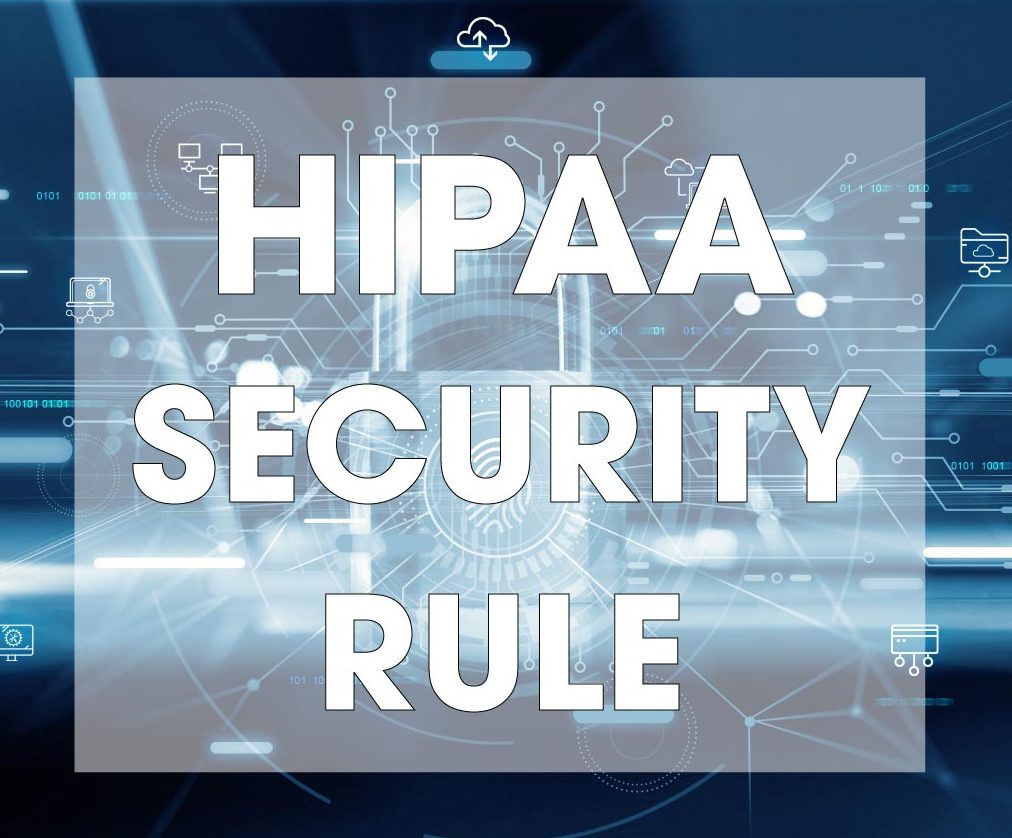
The HIPAA Security Rule
The HIPAA Security Rule was published in 2003. The Rule is a subset of the Privacy Rule inasmuch as it establishes minimum standards to protect electronic PHI (ePHI) from unauthorized uses and disclosures while at rest and in transit, ensure ePHI is not altered or destroyed inappropriately, and ensure appropriate access controls are implemented to monitor when and how ePHI is accessed. To simplify compliance, the HIPAA Security Rule is divided into three areas:
- Administrative Safeguards
- Physical Safeguards
- Technical Safeguards
Administrative Safeguards
The Administrative Safeguards consist of actions, policies, and procedures to manage the selection, development, implementation, and maintenance of security measures to protect ePHI. They also cover the conduct of Covered Entity´s and Business Associate´s workforces in relation to the safeguarding of ePHI from unauthorized uses and disclosures.
Both Covered Entities and Business Associates must conduct risk assessments and risk analyses to identify risks to ePHI and implement measure to mitigate the risks. Additionally, all members of the workforce must take part in an awareness and training program and be advised of the sanctions they will incur if they are responsible for a violation of HIPAA or a breach of unsecured ePHI.
Physical Safeguards
The Physical Safeguards require Covered Entities and Business Associates to implement measure that restrict physical access to facilities maintaining ePHI – for example, a Cloud Service provider hosting a patient database on behalf of a Covered Entity would have to ensure that their premises are secure and that access to the premises is controlled and monitored.
The Physical Safeguards also apply to physical devices that members of the workforce may use to access ePHI. Therefore, standards exist for the security of workstations, flash drives, mobile devices, and EHRs and controls must be implemented to control who uses these devices, how their activity is monitored, and how the devices are disposed of when no longer required.
Technical Safeguards
In some respects, the Technical Safeguards duplicate the standards of the Physical Safeguards inasmuch as many of the implementation specifications relate to access control, event logging, and monitoring activity. However, it is also necessary for Covered Entities and Business Associates to implement electronic measures that ensure ePHI is not improperly destroyed or altered.
Additionally, Covered Entities and Business Associates must implement measures to guard against unauthorized access to ePHI in transit. In most cases, the encryption of data satisfies this requirement, but it may be necessary to implement additional measures to guard against man-in-the-middle attacks when using public Wi-Fi or other unsecure channels of communication.
The HIPAA Enforcement Rule
When the HIPAA Privacy Rule was published in 2002, the section relating to “Enforcement and Penalties for Noncompliance” stated that the Department of Health & Human Services (HHS) would seek the cooperation of Covered Entities and provide assistance to support voluntary compliance. The Privacy Rule also included modest civil money penalties for noncompliance starting at $100 per Privacy Rule violation and increasing to a maximum of $25,000 for multiple violations.
The language of the Privacy Rule led many sceptics to comment that HHS was following a “policy of nonenforcement”. So, in 2005, HHS published the HIPAA Enforcement Rule that included new General Administrative Requirements relating to compliance and the procedures for conducting investigations. Although these initially had little impact on HIPAA compliance, the Enforcement Rule served as a steppingstone for tougher enforcement via the Breach Notification Rule.

What is the HITECH Act 2009?
The Health Information Technology for Economic and Clinical Health (HITECH) Act was introduced in an attempt to increase the alarmingly low rate of hospitals that adopted Electronic Health Records (EHRs). Although not a HIPAA Rule, changes had to be made to the HIPAA laws to address the increasing number of Covered Entities that would collect, store, and share ePHI electronically, and the likelihood that this could lead to an increasing number of breaches of unsecured ePHI.
These changes had a significant impact on HIPAA compliance and enforcement. From the enactment of HITECH, a new HIPAA Breach Notification Rule came into force, and State Attorneys General were given powers to take civil action against a Covered Entity responsible for a breach of unsecured ePHI. Subsequent changes attributable to the HITECH Act followed in the HIPAA Omnibus Rule in 2013, which included Business Associates now having to be compliant with certain HIPAA laws, and patients having additional Privacy Rule rights to access, review, correct, and transfer their PHI.
HIPAA Breach Notification Requirements
The HIPAA Breach Notification Rule outlines the processes a Covered Entity must follow when a breach of unsecured ePHI is identified. The processes are dependent on the extent of the breach. If the breach is deemed to be large, affecting over 500 individuals´ PHI, patients must be informed immediately and the HHS´ Office for Civil Rights notified within sixty days. Additionally, a media outlet source must be informed to issue a press release detailing the breach of data.
If a minor breach occurs, affected individuals must be informed and the breach included in a report to HHS´ Office for Civil Rights at the end of the calendar year. The exception to the HIPAA Breach Notification Requirements is when it can be demonstrated there is a low probability that PHI has been compromised by the unauthorized use or disclosure and there is a negligible likelihood that the subject(s) of the data breach will suffer harm. In these circumstances it is not necessary to report the breach to either the individual or the HHS´ Office for Civil Rights.
What Civil Penalty is Issued when a HIPAA Violation Occurs?
Although the Breach Notification Rule gave the HHS´ Office for Civil Rights to pursue enforcement action more rigorously, the majority of HIPAA violations and data breaches are resolved by technical assistance and Correct Action Orders. Where a violation or breach is considered sufficiently serious to warrant a civil penalty, the HHS´ Office for Civil Rights has adopted a four-tier scale of penalties depending on the nature of the event, the harm that resulted, and the level of culpability.
- Tier 1 – For Covered Entities and Business Associates that did not know – and could not have known by exercising reasonable due diligence – about the violation.
- Tier 2 – For Covered Entities and Business Associates when an avoidable violation occurs due to a reasonable cause, but not willful neglect.
- Tier 3 – For Covered Entities and Business Entities when a violation occurs due to willful neglect and the violation is corrected within 30 days.
- Tier 4 – For Covered Entities and Business Entities when a violation occurs due to willful neglect and the violation is not corrected within 30 days.
The HITECH Act significantly increased the amounts the HHS´ Office for Civil Rights can issue as civil penalties, and these amounts have since been adjusted to account for inflation. As of January 2024, the civil penalties that can be issued when a violation of HIPAA occurs are:
| Penalty Tier | Level of Culpability | Minimum Penalty per Violation | Maximum Penalty per Violation | Annual Penalty Limit |
|---|---|---|---|---|
| Tier 1 | Lack of Knowledge | $137 | $34,464 | $34,464 |
| Tier 2 | Reasonable Cause | $1,379 | $68,928 | $137,886 |
| Tier 3 | Willful Neglect | $13,785 | $68,928 | $344,638 |
| Tier 4 | Willful Neglect not Corrected within 30 days | $68,928 | $68,928 | $2,067,813 |
The HIPAA Final Omnibus Rule
The HIPAA laws were updated via the publication of the HIPAA Final Omnibus Rule in 2013 to incorporate most of the privacy provisions of the HITECH Act and implement changes attributable to the passage of the Genetic Information Nondiscrimination Act (GINA). As mentioned previously, the major changes to the HIPAA laws included making Business Associates directly liable for compliance with certain HIPAA laws and expanding patients´ Privacy Rule rights. Other changes included:
- Strengthening the limitations on uses and disclosures of PHI.
- Prohibiting the sale of PHI without individual authorization.
- Modifications to the requirements for Notices of Privacy Practices.
- Adopting additional HITECH Act enhancements to the Enforcement Rule.
The HIPAA Final Omnibus Rule was most effective in raising awareness of the HIPAA laws. Additionally, the HHS´ Office for Civil Rights was given the resources to pursue enforcement action more effectively, resulting in Covered Entities and Business Associates taking HIPAA compliance more seriously.

FAQs
What is the purpose of the HIPAA law?
The purpose of the HIPAA law is to establish national standards for the protection of individuals’ health information and to ensure the privacy, security, and confidentiality of their protected health information (PHI). This law aims to strike a balance between facilitating the exchange of healthcare information necessary for providing quality care and protecting the sensitive and personal nature of individuals’ health data. By setting these standards, HIPAA safeguards the privacy rights of patients and provides them with control over their health information, while also establishing guidelines for healthcare providers, health plans, and other entities to follow in order to safeguard PHI.
What does HIPAA stand for?
HIPAA stands for the Health Insurance Portability and Accountability Act, which is a federal law enacted in 1996 to address various aspects of healthcare, including health insurance coverage, healthcare transactions, and the privacy and security of health information. The law consists of several provisions, with Title II specifically focusing on administrative simplification, which includes the Privacy Rule and the Security Rule. These rules establish standards and requirements for the protection of individuals’ health information and the secure electronic exchange of health data.
What is the significance of HIPAA laws for healthcare providers?
HIPAA laws have significant implications for healthcare providers as they regulate the privacy and security of patients’ protected health information (PHI) and establish standards that healthcare providers must follow to protect patient privacy. Healthcare providers are required to implement administrative, physical, and technical safeguards to protect PHI, develop policies and procedures that address privacy and security, provide training to employees, and obtain patient consent for certain uses and disclosures of PHI. Compliance with HIPAA laws is crucial for healthcare providers to maintain patient trust, ensure the confidentiality of health information, and avoid potential legal and financial consequences.
Are all healthcare providers required to comply with HIPAA laws?
Yes, all healthcare providers, including doctors, hospitals, clinics, pharmacies, nursing homes, and other healthcare professionals and organizations, are required to comply with HIPAA laws. Whether a healthcare provider is a covered entity or a business associate, they must adhere to the rules and requirements set forth by HIPAA to protect the privacy and security of patients’ health information. Compliance with HIPAA laws is not only a legal obligation but also an ethical responsibility for healthcare providers.
What is considered protected health information (PHI) under HIPAA laws?
Protected health information (PHI) under HIPAA laws refers to any individually identifiable health information held or transmitted by a covered entity or business associate, in any form or medium. This includes demographic information, medical records, test results, insurance information, and any other information that relates to an individual’s past, present, or future physical or mental health condition, healthcare services received, or payment for healthcare services. PHI is a broad category that encompasses various types of health-related data and personal identifiers, and its protection is paramount under HIPAA laws.
What are the rights granted to patients under HIPAA laws regarding their protected health information (PHI)?
HIPAA laws grant patients several rights regarding their protected health information (PHI). These include the right to access and obtain a copy of their PHI, request amendments to their PHI if they believe it is incorrect or incomplete, receive an accounting of disclosures of their PHI, request restrictions on the use and disclosure of their PHI, and receive confidential communications of their PHI. These rights empower patients to have control over their health information, be informed about how their information is used and disclosed, and ensure the accuracy and privacy of their health records.
Can healthcare providers share protected health information (PHI) with family members or friends without patient consent under HIPAA laws?
Yes, healthcare providers can share protected health information (PHI) with family members or friends without patient consent under HIPAA laws in certain situations. The HIPAA Privacy Rule allows for the disclosure of PHI to family members, friends, or other individuals involved in a patient’s care or payment for healthcare, provided that the patient does not object to the disclosure or is not incapacitated. In such cases, healthcare providers may exercise their professional judgment to determine whether it is in the best interest of the patient to share PHI with these individuals. However, healthcare providers must still respect the patient’s privacy and disclose only the minimum necessary information to facilitate care or payment.
Can patients request a copy of their medical records from healthcare providers under HIPAA laws?
Yes, patients have the right to request and obtain a copy of their medical records from healthcare providers under HIPAA laws. This right is granted by the HIPAA Privacy Rule, which ensures that patients have access to their health information and can be active participants in their own care. Healthcare providers must respond to these requests in a timely manner, generally within 30 days, and provide the requested records in the format preferred by the patient, if readily producible. Patients may be charged a reasonable fee for the copying and mailing of the records, but healthcare providers cannot withhold the records based on outstanding balances or other financial considerations.
What are the requirements for healthcare providers to protect the privacy and security of protected health information (PHI) under HIPAA laws?
HIPAA laws require healthcare providers to implement various safeguards to protect the privacy and security of protected health information (PHI). These safeguards include administrative safeguards, such as developing and implementing privacy policies and procedures, designating a privacy officer, and providing workforce training; physical safeguards, including securing facilities and workstations that have access to PHI; and technical safeguards, such as using access controls, encryption, and secure communication protocols for electronic PHI. Furthermore, healthcare providers must conduct regular risk assessments, maintain audit trails, and have contingency plans in place to respond to potential privacy and security breaches. Compliance with these requirements helps ensure the confidentiality, integrity, and availability of PHI and mitigates the risk of unauthorized access or disclosure.
What penalties can healthcare providers face for non-compliance with HIPAA laws?
Healthcare providers can face penalties for non-compliance with HIPAA laws, including civil monetary penalties, criminal penalties, and corrective actions. The exact penalties depend on the nature and severity of the violation. Civil monetary penalties can range from $100 to $50,000 per violation, with an annual maximum penalty of $1.5 million for each violation category. These penalties are tiered based on the level of culpability, with higher penalties for cases involving willful neglect and no corrective action. Criminal penalties can result in fines and imprisonment, particularly for intentional or malicious violations of HIPAA laws. Additionally, healthcare providers may be required to implement corrective action plans, undergo audits, or face other enforcement actions to address compliance deficiencies. It is essential for healthcare providers to prioritize HIPAA compliance to avoid these penalties and maintain patient trust and privacy.
Can patients file complaints if they believe their rights under HIPAA laws have been violated?
Yes, patients have the right to file complaints with the Office for Civil Rights (OCR) if they believe their rights under HIPAA laws have been violated. The OCR is the federal agency responsible for enforcing HIPAA and investigating complaints. Patients can submit complaints by providing details of the alleged violation, the parties involved, and any supporting evidence. The OCR assesses the complaints and takes appropriate action, which may include conducting investigations, providing technical assistance to covered entities, mediating resolutions, or imposing penalties for non-compliance. Filing complaints is an important mechanism for patients to hold healthcare providers accountable and ensure that their rights to privacy and the protection of their health information are respected.
Do HIPAA laws apply to healthcare providers outside of the United States?
HIPAA laws generally do not apply to healthcare providers outside of the United States. The primary jurisdiction of HIPAA laws is limited to covered entities and business associates within the United States. However, if a foreign healthcare provider conducts transactions or activities that involve the use or disclosure of protected health information (PHI) with a covered entity in the United States, they may be subject to certain provisions of HIPAA laws known as the HIPAA Privacy Rule. This rule requires foreign healthcare providers to comply with specific privacy and security requirements when handling PHI received from or shared with covered entities in the United States.
Are business associates of healthcare providers required to comply with HIPAA laws?
Yes, business associates of healthcare providers are required to comply with HIPAA laws. A business associate is an individual or entity that performs certain functions or services on behalf of a covered entity that involves the use or disclosure of protected health information (PHI). Business associates must comply with the HIPAA Privacy Rule and Security Rule, including implementing appropriate safeguards, entering into business associate agreements with covered entities, and maintaining the privacy and security of PHI. These agreements outline the responsibilities and obligations of business associates to protect PHI and ensure compliance with HIPAA laws. By holding business associates accountable, HIPAA laws ensure that the protection of PHI extends beyond covered entities and encompasses all entities involved in handling patient health information.
Can healthcare providers disclose protected health information (PHI) without patient consent for research purposes under HIPAA laws?
Yes, healthcare providers can disclose protected health information (PHI) without patient consent for research purposes under HIPAA laws, provided that certain conditions and safeguards are met. The HIPAA Privacy Rule allows for the use and disclosure of PHI for research purposes when authorized by the individual or when the research project has received an appropriate waiver of authorization. To obtain a waiver of authorization, researchers must demonstrate that the research meets specific criteria, such as the minimal risk to individuals’ privacy, a plan to protect PHI, and the impracticality of obtaining individual consent. Additionally, researchers must ensure that PHI is only used or disclosed as necessary for the research, and reasonable safeguards are in place to protect the privacy and security of the information. These provisions strike a balance between facilitating valuable medical research and protecting the privacy and confidentiality of individuals participating in research studies.
Do HIPAA laws allow for the de-identification of protected health information (PHI) for research purposes?
Yes, HIPAA laws allow for the de-identification of protected health information (PHI) for research purposes. De-identification involves removing or modifying certain identifiers that could potentially identify individuals, making the information anonymous. The HIPAA Privacy Rule provides specific guidelines and methods for de-identifying PHI, including both the “safe harbor” method and the “expert determination” method. The safe harbor method involves removing specific identifiers listed in the Privacy Rule, such as names, addresses, and social security numbers. The expert determination method requires the involvement of a qualified researcher or statistician who assesses the risk of re-identification and applies appropriate statistical or scientific methods to ensure the de-identification of PHI. Once PHI has been properly de-identified, it is no longer considered PHI and can be used or disclosed for research purposes without individual consent. De-identification allows researchers to utilize health information while protecting the privacy and confidentiality of individuals involved in the research studies.
Can healthcare providers use protected health information (PHI) for marketing purposes without patient authorization under HIPAA laws?
No, healthcare providers generally cannot use protected health information (PHI) for marketing purposes without patient authorization under HIPAA laws. The HIPAA Privacy Rule requires covered entities to obtain written authorization from patients before using their PHI for marketing purposes, with limited exceptions. Marketing refers to communication about a product or service that encourages recipients to purchase or use the product or service. However, there are situations where covered entities can use PHI for certain marketing communications without patient authorization, such as providing information about health-related products or services within the provider’s scope of practice, case management or care coordination, or promoting government-sponsored health programs. Nevertheless, healthcare providers must always comply with HIPAA laws and ensure that patients’ privacy rights are protected when using their PHI for marketing purposes.
Can healthcare providers use and disclose protected health information (PHI) for treatment, payment, and healthcare operations without patient authorization under HIPAA laws?
Yes, healthcare providers can use and disclose protected health information (PHI) for treatment, payment, and healthcare operations without patient authorization under HIPAA laws. The HIPAA Privacy Rule permits covered entities to use and disclose PHI for these purposes without obtaining patient consent. Treatment includes providing, coordinating, or managing healthcare and related services. Payment refers to activities such as billing, claims processing, and reimbursement for healthcare services. Healthcare operations encompass activities such as quality assessment, legal and compliance functions, and conducting medical research. While patient authorization is not required for these purposes, covered entities must ensure that the use and disclosure of PHI are limited to the minimum necessary information needed for the specific purpose and that appropriate safeguards are in place to protect patient privacy and security. This allows for effective healthcare delivery, proper billing and reimbursement, and efficient healthcare operations while upholding the privacy and confidentiality of patient health information.
Can patients access and obtain a copy of their protected health information (PHI) from healthcare providers under HIPAA laws?
Yes, patients have the right to access and obtain a copy of their protected health information (PHI) from healthcare providers under HIPAA laws. The HIPAA Privacy Rule grants patients the right to inspect, review, and receive a copy of their PHI that is maintained by covered entities, such as healthcare providers. Patients can request access to their PHI in a designated record set, which includes medical records, billing records, and any other records used to make decisions about the individual. Healthcare providers must respond to these requests in a timely manner, generally within 30 days, and provide the requested information in the format requested by the patient if it is readily producible. However, healthcare providers may charge a reasonable fee for the cost of copying and mailing the records. The right to access and obtain a copy of PHI empowers patients to be informed about their health information, engage in their healthcare decisions, and ensure the accuracy and completeness of their health records.
What are the requirements for healthcare providers to protect the privacy and security of protected health information (PHI) under HIPAA laws?
HIPAA laws impose several requirements on healthcare providers to protect the privacy and security of protected health information (PHI). Healthcare providers must implement administrative, physical, and technical safeguards to secure PHI from unauthorized access, use, or disclosure. These safeguards include developing and implementing policies and procedures, providing workforce training on privacy and security, conducting regular risk assessments, implementing access controls and audit trails, encrypting electronic PHI, and having contingency plans for disaster recovery. Additionally, healthcare providers must designate a privacy officer and a security officer responsible for overseeing compliance with HIPAA laws. By meeting these requirements, healthcare providers can ensure the confidentiality, integrity, and availability of PHI, protect patient privacy, and mitigate the risk of data breaches or unauthorized disclosures.
What penalties can healthcare providers face for non-compliance with HIPAA laws?
Non-compliance with HIPAA laws can subject healthcare providers to various penalties, including civil monetary penalties, criminal penalties, and corrective actions. Civil monetary penalties depend on the nature and extent of the violation. They range from $100 to $50,000 per violation, with an annual maximum penalty of $1.5 million for each violation category. Criminal penalties can result in fines and imprisonment, particularly for intentional or malicious violations of HIPAA laws. Corrective actions may involve implementing changes to comply with HIPAA laws, undergoing audits, or developing and implementing corrective action plans. The Department of Health and Human Services (HHS) Office for Civil Rights (OCR) is responsible for enforcing HIPAA laws and may initiate investigations and impose penalties for non-compliance. It is essential for healthcare providers to prioritize HIPAA compliance, implement robust privacy and security measures, and establish a culture of compliance to avoid penalties, protect patient information, and maintain trust within the healthcare community.
Can patients file complaints if they believe their rights under HIPAA laws have been violated?
Yes, patients have the right to file complaints with the Office for Civil Rights (OCR) if they believe their rights under HIPAA laws have been violated. The OCR is the federal agency responsible for enforcing HIPAA and investigating complaints. Patients can submit complaints online, by mail, or by phone, providing details of the alleged violation, the parties involved, and any supporting evidence. The OCR assesses the complaints and takes appropriate action, which may include conducting investigations, providing technical assistance to covered entities, mediating resolutions, or imposing penalties for non-compliance. Filing a complaint with the OCR is an important mechanism for patients to assert their rights, hold healthcare providers accountable, and contribute to the overall enforcement and improvement of HIPAA laws.
Can healthcare providers disclose protected health information (PHI) to law enforcement without patient consent under HIPAA laws?
Yes, healthcare providers can disclose protected health information (PHI) to law enforcement without patient consent under certain circumstances allowed by HIPAA laws. The HIPAA Privacy Rule permits healthcare providers to disclose PHI to law enforcement officials in response to a valid subpoena, court order, or other lawful process. Additionally, healthcare providers may disclose PHI to law enforcement if they have a good faith belief that the information is evidence of a crime, or if the disclosure is necessary to prevent or lessen a serious and imminent threat to the health or safety of an individual or the public. However, healthcare providers must ensure that the disclosure is limited to the minimum necessary information required for the purpose, and they may consider factors such as professional judgment, applicable laws, and ethical responsibilities when deciding to disclose PHI to law enforcement.
Can healthcare providers use or disclose protected health information (PHI) for fundraising purposes without patient authorization under HIPAA laws?
Yes, healthcare providers can use or disclose protected health information (PHI) for fundraising purposes without patient authorization under certain conditions permitted by HIPAA laws. The HIPAA Privacy Rule allows healthcare providers to use certain limited PHI, such as demographic information and dates of healthcare provided, for fundraising activities. However, patients must be given an opportunity to opt out of receiving fundraising communications, and healthcare providers must inform patients about their right to opt out at the time of service or in fundraising communications. If a patient chooses to opt out, the healthcare provider must honor the patient’s request and not use or disclose their PHI for fundraising purposes. This provision balances the need for fundraising efforts with patient privacy preferences and provides patients with control over how their health information is used for fundraising activities.
Can healthcare providers use protected health information (PHI) for marketing purposes without patient authorization under HIPAA laws?
No, healthcare providers generally cannot use protected health information (PHI) for marketing purposes without patient authorization under HIPAA laws. The HIPAA Privacy Rule requires covered entities to obtain written authorization from patients before using their PHI for marketing purposes, with limited exceptions. Marketing refers to communication about a product or service that encourages recipients to purchase or use the product or service. However, there are situations where covered entities can use PHI for certain marketing communications without patient authorization, such as providing information about health-related products or services within the provider’s scope of practice, case management or care coordination, or promoting government-sponsored health programs. Nevertheless, healthcare providers must always comply with HIPAA laws and ensure that patients’ privacy rights are protected when using their PHI for marketing purposes.
Can healthcare providers use and disclose protected health information (PHI) for treatment, payment, and healthcare operations without patient authorization under HIPAA laws?
Yes, healthcare providers can use and disclose protected health information (PHI) for treatment, payment, and healthcare operations without patient authorization under HIPAA laws. The HIPAA Privacy Rule permits covered entities to use and disclose PHI for these purposes without obtaining patient consent. Treatment includes providing, coordinating, or managing healthcare and related services. Payment refers to activities such as billing, claims processing, and reimbursement for healthcare services. Healthcare operations encompass activities such as quality assessment, legal and compliance functions, and conducting medical research. While patient authorization is not required for these purposes, covered entities must ensure that the use and disclosure of PHI are limited to the minimum necessary information needed for the specific purpose and that appropriate safeguards are in place to protect patient privacy and security. This allows for effective healthcare delivery, proper billing and reimbursement, and efficient healthcare operations while upholding the privacy and confidentiality of patient health information.
Can patients access and obtain a copy of their protected health information (PHI) from healthcare providers under HIPAA laws?
Yes, patients have the right to access and obtain a copy of their protected health information (PHI) from healthcare providers under HIPAA laws. The HIPAA Privacy Rule grants patients the right to inspect, review, and receive a copy of their PHI that is maintained by covered entities, such as healthcare providers. Patients can request access to their PHI in a designated record set, which includes medical records, billing records, and any other records used to make decisions about the individual. Healthcare providers must respond to these requests in a timely manner, generally within 30 days, and provide the requested information in the format requested by the patient if it is readily producible. However, healthcare providers may charge a reasonable fee for the cost of copying and mailing the records. The right to access and obtain a copy of PHI empowers patients to be informed about their health information, engage in their healthcare decisions, and ensure the accuracy and completeness of their health records.
What are the requirements for healthcare providers to protect the privacy and security of protected health information (PHI) under HIPAA laws?
HIPAA laws impose several requirements on healthcare providers to protect the privacy and security of protected health information (PHI). Healthcare providers must implement administrative, physical, and technical safeguards to secure PHI from unauthorized access, use, or disclosure. These safeguards include developing and implementing policies and procedures, providing workforce training on privacy and security, conducting regular risk assessments, implementing access controls and audit trails, encrypting electronic PHI, and having contingency plans for disaster recovery. Additionally, healthcare providers must designate a privacy officer and a security officer responsible for overseeing compliance with HIPAA laws. By meeting these requirements, healthcare providers can ensure the confidentiality, integrity, and availability of PHI, protect patient privacy, and mitigate the risk of data breaches or unauthorized disclosures.
What penalties can healthcare providers face for non-compliance with HIPAA laws?
Non-compliance with HIPAA laws can subject healthcare providers to various penalties, including civil monetary penalties, criminal penalties, and corrective actions. Civil monetary penalties depend on the nature and extent of the violation. They range from $100 to $50,000 per violation, with an annual maximum penalty of $1.5 million for each violation category. These penalties are tiered based on the level of culpability, with higher penalties for cases involving willful neglect and no corrective action. Criminal penalties can result in fines and imprisonment, particularly for intentional or malicious violations of HIPAA laws. Additionally, healthcare providers may be required to implement corrective action plans, undergo audits, or face other enforcement actions to address compliance deficiencies. The Department of Health and Human Services (HHS) Office for Civil Rights (OCR) is responsible for enforcing HIPAA laws and may initiate investigations and impose penalties for non-compliance. It is essential for healthcare providers to prioritize HIPAA compliance, implement robust privacy and security measures, and establish a culture of compliance to avoid penalties, protect patient information, and maintain trust within the healthcare community.
Can patients file complaints if they believe their rights under HIPAA laws have been violated?
Yes, patients have the right to file complaints with the Office for Civil Rights (OCR) if they believe their rights under HIPAA laws have been violated. The OCR is the federal agency responsible for enforcing HIPAA and investigating complaints. Patients can submit complaints online, by mail, or by phone, providing details of the alleged violation, the parties involved, and any supporting evidence. The OCR assesses the complaints and takes appropriate action, which may include conducting investigations, providing technical assistance to covered entities, mediating resolutions, or imposing penalties for non-compliance. Filing a complaint with the OCR is an important mechanism for patients to assert their rights, hold healthcare providers accountable, and contribute to the overall enforcement and improvement of HIPAA laws.
Can healthcare providers disclose protected health information (PHI) to law enforcement without patient consent under HIPAA laws?
Yes, healthcare providers can disclose protected health information (PHI) to law enforcement without patient consent under certain circumstances allowed by HIPAA laws. The HIPAA Privacy Rule permits healthcare providers to disclose PHI to law enforcement officials in response to a valid subpoena, court order, or other lawful process. Additionally, healthcare providers may disclose PHI to law enforcement if they have a good faith belief that the information is evidence of a crime, or if the disclosure is necessary to prevent or lessen a serious and imminent threat to the health or safety of an individual or the public. However, healthcare providers must ensure that the disclosure is limited to the minimum necessary information required for the purpose, and they may consider factors such as professional judgment, applicable laws, and ethical responsibilities when deciding to disclose PHI to law enforcement.
Can healthcare providers use or disclose protected health information (PHI) for fundraising purposes without patient authorization under HIPAA laws?
Yes, healthcare providers can use or disclose protected health information (PHI) for fundraising purposes without patient authorization under certain conditions permitted by HIPAA laws. The HIPAA Privacy Rule allows healthcare providers to use certain limited PHI, such as demographic information and dates of healthcare provided, for fundraising activities. However, patients must be given an opportunity to opt out of receiving fundraising communications, and healthcare providers must inform patients about their right to opt out at the time of service or in fundraising communications. If a patient chooses to opt out, the healthcare provider must honor the patient’s request and not use or disclose their PHI for fundraising purposes. This provision balances the need for fundraising efforts with patient privacy preferences and provides patients with control over how their health information is used for fundraising activities.
Can healthcare providers use protected health information (PHI) for marketing purposes without patient authorization under HIPAA laws?
No, healthcare providers generally cannot use protected health information (PHI) for marketing purposes without patient authorization under HIPAA laws. The HIPAA Privacy Rule requires covered entities to obtain written authorization from patients before using their PHI for marketing purposes, with limited exceptions. Marketing refers to communication about a product or service that encourages recipients to purchase or use the product or service. However, there are situations where covered entities can use PHI for certain marketing communications without patient authorization, such as providing information about health-related products or services within the provider’s scope of practice, case management or care coordination, or promoting government-sponsored health programs. Nevertheless, healthcare providers must always comply with HIPAA laws and ensure that patients’ privacy rights are protected when using their PHI for marketing purposes.
Can healthcare providers use and disclose protected health information (PHI) for treatment, payment, and healthcare operations without patient authorization under HIPAA laws?
Yes, healthcare providers can use and disclose protected health information (PHI) for treatment, payment, and healthcare operations without patient authorization under HIPAA laws. The HIPAA Privacy Rule permits covered entities to use and disclose PHI for these purposes without obtaining patient consent. Treatment includes providing, coordinating, or managing healthcare and related services. Payment refers to activities such as billing, claims processing, and reimbursement for healthcare services. Healthcare operations encompass activities such as quality assessment, legal and compliance functions, and conducting medical research. While patient authorization is not required for these purposes, covered entities must ensure that the use and disclosure of PHI are limited to the minimum necessary information needed for the specific purpose and that appropriate safeguards are in place to protect patient privacy and security. This allows for effective healthcare delivery, proper billing and reimbursement, and efficient healthcare operations while upholding the privacy and confidentiality of patient health information.
Can patients access and obtain a copy of their protected health information (PHI) from healthcare providers under HIPAA laws?
Yes, patients have the right to access and obtain a copy of their protected health information (PHI) from healthcare providers under HIPAA laws. The HIPAA Privacy Rule grants patients the right to inspect, review, and receive a copy of their PHI that is maintained by covered entities, such as healthcare providers. Patients can request access to their PHI in a designated record set, which includes medical records, billing records, and any other records used to make decisions about the individual. Healthcare providers must respond to these requests in a timely manner, generally within 30 days, and provide the requested information in the format requested by the patient if it is readily producible. However, healthcare providers may charge a reasonable fee for the cost of copying and mailing the records. The right to access and obtain a copy of PHI empowers patients to be informed about their health information, engage in their healthcare decisions, and ensure the accuracy and completeness of their health records.
What are the requirements for healthcare providers to protect the privacy and security of protected health information (PHI) under HIPAA laws?
HIPAA laws impose several requirements on healthcare providers to protect the privacy and security of protected health information (PHI). Healthcare providers must implement administrative, physical, and technical safeguards to secure PHI from unauthorized access, use, or disclosure. These safeguards include developing and implementing policies and procedures, providing workforce training on privacy and security, conducting regular risk assessments, implementing access controls and audit trails, encrypting electronic PHI, and having contingency plans for disaster recovery. Additionally, healthcare providers must designate a privacy officer and a security officer responsible for overseeing compliance with HIPAA laws. By meeting these requirements, healthcare providers can ensure the confidentiality, integrity, and availability of PHI, protect patient privacy, and mitigate the risk of data breaches or unauthorized disclosures.
What penalties can healthcare providers face for non-compliance with HIPAA laws?
Non-compliance with HIPAA laws can subject healthcare providers to various penalties, including civil monetary penalties, criminal penalties, and corrective actions. Civil monetary penalties depend on the nature and extent of the violation. They range from $100 to $50,000 per violation, with an annual maximum penalty of $1.5 million for each violation category. These penalties are tiered based on the level of culpability, with higher penalties for cases involving willful neglect and no corrective action. Criminal penalties can result in fines and imprisonment, particularly for intentional or malicious violations of HIPAA laws. Additionally, healthcare providers may be required to implement corrective action plans, undergo audits, or face other enforcement actions to address compliance deficiencies. The Department of Health and Human Services (HHS) Office for Civil Rights (OCR) is responsible for enforcing HIPAA laws and may initiate investigations and impose penalties for non-compliance. It is essential for healthcare providers to prioritize HIPAA compliance, implement robust privacy and security measures, and establish a culture of compliance to avoid penalties, protect patient information, and maintain trust within the healthcare community.
Can patients file complaints if they believe their rights under HIPAA laws have been violated?
Yes, patients have the right to file complaints with the Office for Civil Rights (OCR) if they believe their rights under HIPAA laws have been violated. The OCR is the federal agency responsible for enforcing HIPAA and investigating complaints. Patients can submit complaints online, by mail, or by phone, providing details of the alleged violation, the parties involved, and any supporting evidence. The OCR assesses the complaints and takes appropriate action, which may include conducting investigations, providing technical assistance to covered entities, mediating resolutions, or imposing penalties for non-compliance. Filing a complaint with the OCR is an important mechanism for patients to assert their rights, hold healthcare providers accountable, and contribute to the overall enforcement and improvement of HIPAA laws.
Can healthcare providers disclose protected health information (PHI) to law enforcement without patient consent under HIPAA laws?
Yes, healthcare providers can disclose protected health information (PHI) to law enforcement without patient consent under certain circumstances allowed by HIPAA laws. The HIPAA Privacy Rule permits healthcare providers to disclose PHI to law enforcement officials in response to a valid subpoena, court order, or other lawful process. Additionally, healthcare providers may disclose PHI to law enforcement if they have a good faith belief that the information is evidence of a crime, or if the disclosure is necessary to prevent or lessen a serious and imminent threat to the health or safety of an individual or the public. However, healthcare providers must ensure that the disclosure is limited to the minimum necessary information required for the purpose, and they may consider factors such as professional judgment, applicable laws, and ethical responsibilities when deciding to disclose PHI to law enforcement.
Can healthcare providers use or disclose protected health information (PHI) for fundraising purposes without patient authorization under HIPAA laws?
Yes, healthcare providers can use or disclose protected health information (PHI) for fundraising purposes without patient authorization under certain conditions permitted by HIPAA laws. The HIPAA Privacy Rule allows healthcare providers to use certain limited PHI, such as demographic information and dates of healthcare provided, for fundraising activities. However, patients must be given an opportunity to opt out of receiving fundraising communications, and healthcare providers must inform patients about their right to opt out at the time of service or in fundraising communications. If a patient chooses to opt out, the healthcare provider must honor the patient’s request and not use or disclose their PHI for fundraising purposes. This provision balances the need for fundraising efforts with patient privacy preferences and provides patients with control over how their health information is used for fundraising activities.
Can healthcare providers use protected health information (PHI) for marketing purposes without patient authorization under HIPAA laws?
No, healthcare providers generally cannot use protected health information (PHI) for marketing purposes without patient authorization under HIPAA laws. The HIPAA Privacy Rule requires covered entities to obtain written authorization from patients before using their PHI for marketing purposes, with limited exceptions. Marketing refers to communication about a product or service that encourages recipients to purchase or use the product or service. However, there are situations where covered entities can use PHI for certain marketing communications without patient authorization, such as providing information about health-related products or services within the provider’s scope of practice, case management or care coordination, or promoting government-sponsored health programs. Nevertheless, healthcare providers must always comply with HIPAA laws and ensure that patients’ privacy rights are protected when using their PHI for marketing purposes.
Can healthcare providers use and disclose protected health information (PHI) for treatment, payment, and healthcare operations without patient authorization under HIPAA laws?
Yes, healthcare providers can use and disclose protected health information (PHI) for treatment, payment, and healthcare operations without patient authorization under HIPAA laws. The HIPAA Privacy Rule permits covered entities to use and disclose PHI for these purposes without obtaining patient consent. Treatment includes providing, coordinating, or managing healthcare and related services. Payment refers to activities such as billing, claims processing, and reimbursement for healthcare services. Healthcare operations encompass activities such as quality assessment, legal and compliance functions, and conducting medical research. While patient authorization is not required for these purposes, covered entities must ensure that the use and disclosure of PHI are limited to the minimum necessary information needed for the specific purpose and that appropriate safeguards are in place to protect patient privacy and security. This allows for effective healthcare delivery, proper billing and reimbursement, and efficient healthcare operations while upholding the privacy and confidentiality of patient health information.
Can patients access and obtain a copy of their protected health information (PHI) from healthcare providers under HIPAA laws?
Yes, patients have the right to access and obtain a copy of their protected health information (PHI) from healthcare providers under HIPAA laws. The HIPAA Privacy Rule grants patients the right to inspect, review, and receive a copy of their PHI that is maintained by covered entities, such as healthcare providers. Patients can request access to their PHI in a designated record set, which includes medical records, billing records, and any other records used to make decisions about the individual. Healthcare providers must respond to these requests in a timely manner, generally within 30 days, and provide the requested information in the format requested by the patient if it is readily producible. However, healthcare providers may charge a reasonable fee for the cost of copying and mailing the records. The right to access and obtain a copy of PHI empowers patients to be informed about their health information, engage in their healthcare decisions, and ensure the accuracy and completeness of their health records.
What are the requirements for healthcare providers to protect the privacy and security of protected health information (PHI) under HIPAA laws?
HIPAA laws impose several requirements on healthcare providers to protect the privacy and security of protected health information (PHI). Healthcare providers must implement administrative, physical, and technical safeguards to secure PHI from unauthorized access, use, or disclosure. These safeguards include developing and implementing policies and procedures, providing workforce training on privacy and security, conducting regular risk assessments, implementing access controls and audit trails, encrypting electronic PHI, and having contingency plans for disaster recovery. Additionally, healthcare providers must designate a privacy officer and a security officer responsible for overseeing compliance with HIPAA laws. By meeting these requirements, healthcare providers can ensure the confidentiality, integrity, and availability of PHI, protect patient privacy, and mitigate the risk of data breaches or unauthorized disclosures.
What penalties can healthcare providers face for non-compliance with HIPAA laws?
Non-compliance with HIPAA laws can subject healthcare providers to various penalties, including civil monetary penalties, criminal penalties, and corrective actions. Civil monetary penalties depend on the nature and extent of the violation. They range from $100 to $50,000 per violation, with an annual maximum penalty of $1.5 million for each violation category. These penalties are tiered based on the level of culpability, with higher penalties for cases involving willful neglect and no corrective action. Criminal penalties can result in fines and imprisonment, particularly for intentional or malicious violations of HIPAA laws. Additionally, healthcare providers may be required to implement corrective action plans, undergo audits, or face other enforcement actions to address compliance deficiencies. The Department of Health and Human Services (HHS) Office for Civil Rights (OCR) is responsible for enforcing HIPAA laws and may initiate investigations and impose penalties for non-compliance. It is essential for healthcare providers to prioritize HIPAA compliance, implement robust privacy and security measures, and establish a culture of compliance to avoid penalties, protect patient information, and maintain trust within the healthcare community.
Can patients file complaints if they believe their rights under HIPAA laws have been violated?
Yes, patients have the right to file complaints with the Office for Civil Rights (OCR) if they believe their rights under HIPAA laws have been violated. The OCR is the federal agency responsible for enforcing HIPAA and investigating complaints. Patients can submit complaints online, by mail, or by phone, providing details of the alleged violation, the parties involved, and any supporting evidence. The OCR assesses the complaints and takes appropriate action, which may include conducting investigations, providing technical assistance to covered entities, mediating resolutions, or imposing penalties for non-compliance. Filing a complaint with the OCR is an important mechanism for patients to assert their rights, hold healthcare providers accountable, and contribute to the overall enforcement and improvement of HIPAA laws.
Can healthcare providers disclose protected health information (PHI) to law enforcement without patient consent under HIPAA laws?
Yes, healthcare providers can disclose protected health information (PHI) to law enforcement without patient consent under certain circumstances allowed by HIPAA laws. The HIPAA Privacy Rule permits healthcare providers to disclose PHI to law enforcement officials in response to a valid subpoena, court order, or other lawful process. Additionally, healthcare providers may disclose PHI to law enforcement if they have a good faith belief that the information is evidence of a crime, or if the disclosure is necessary to prevent or lessen a serious and imminent threat to the health or safety of an individual or the public. However, healthcare providers must ensure that the disclosure is limited to the minimum necessary information required for the purpose, and they may consider factors such as professional judgment, applicable laws, and ethical responsibilities when deciding to disclose PHI to law enforcement.
Can healthcare providers use or disclose protected health information (PHI) for fundraising purposes without patient authorization under HIPAA laws?
Yes, healthcare providers can use or disclose protected health information (PHI) for fundraising purposes without patient authorization under certain conditions permitted by HIPAA laws. The HIPAA Privacy Rule allows healthcare providers to use certain limited PHI, such as demographic information and dates of healthcare provided, for fundraising activities. However, patients must be given an opportunity to opt out of receiving fundraising communications, and healthcare providers must inform patients about their right to opt out at the time of service or in fundraising communications. If a patient chooses to opt out, the healthcare provider must honor the patient’s request and not use or disclose their PHI for fundraising purposes. This provision balances the need for fundraising efforts with patient privacy preferences and provides patients with control over how their health information is used for fundraising activities.
Photo Credit: stock.adobe.com

